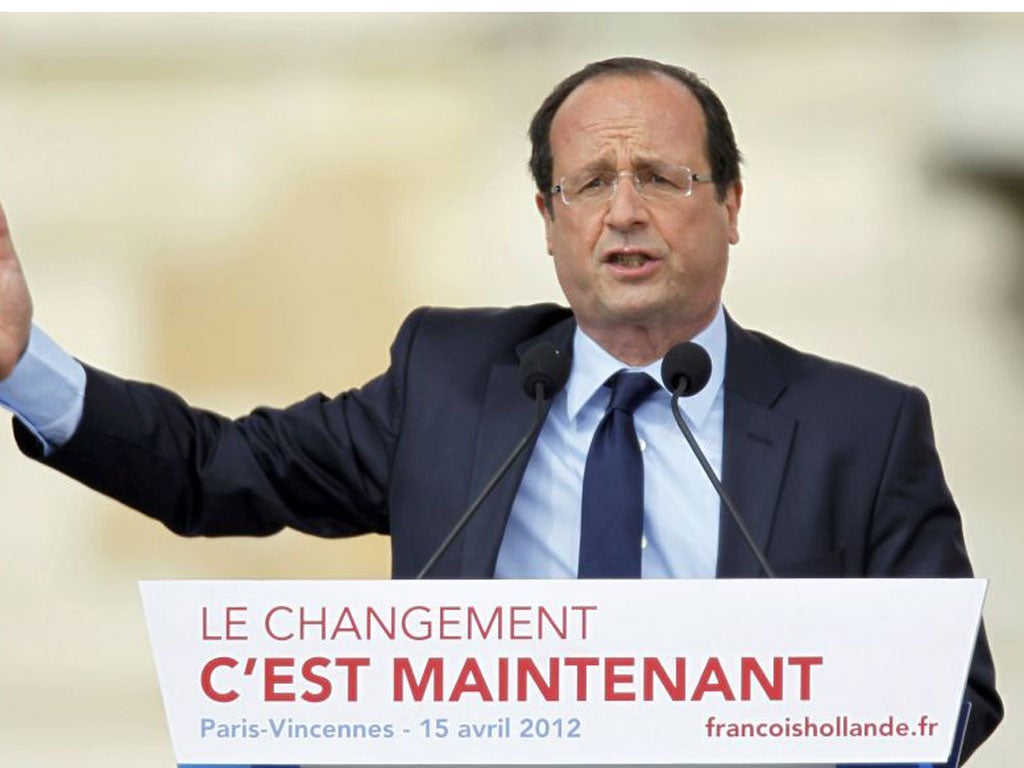François Hollande opts to punish French rich with €20bn of new taxes
Socialist government unveils 75 per cent levy on top earners as part of 2013 austerity budget

Your support helps us to tell the story
From reproductive rights to climate change to Big Tech, The Independent is on the ground when the story is developing. Whether it's investigating the financials of Elon Musk's pro-Trump PAC or producing our latest documentary, 'The A Word', which shines a light on the American women fighting for reproductive rights, we know how important it is to parse out the facts from the messaging.
At such a critical moment in US history, we need reporters on the ground. Your donation allows us to keep sending journalists to speak to both sides of the story.
The Independent is trusted by Americans across the entire political spectrum. And unlike many other quality news outlets, we choose not to lock Americans out of our reporting and analysis with paywalls. We believe quality journalism should be available to everyone, paid for by those who can afford it.
Your support makes all the difference.France's Socialist government insisted yesterday that it could solve the conundrum of simultaneous deficit-cutting and growth which has eluded every other European country from Greece to Britain.
As new clouds gathered over the eurozone, President François Hollande pushed ahead with the country's toughest budget for three decades, taking €20bn (£16bn) of new taxes from big businesses and the wealthy but imposing relatively moderate €10bn cuts on state spending.
With growth stagnant and unemployment rising sharply, the success or failure of the 2013 budget could decide whether Europe's second-largest economy becomes part of solution to the eurozone crisis or a new, and devastating, part of the problem.
International markets became jittery once again yesterday about the prospects for economic and political meltdown in Spain and Greece, following a broadly positive response to the tough budget announced by Madrid on Thursday. An independent audit of Spain's troubled banks showed a shortfall of €59.3bn. The findings of the stress test will help Madrid decide how much money it will tap from a €100bn European loan facility to prop up its financial sector. Jean-Claude Juncker, head of the group of eurozone finance ministers, said he was "comforted" by the results of the test.
If the Spanish budget was tough, the France's was equally so. It reduced the projected state deficit next year to 3 per cent of gross domestic product from 4.6 per cent this year – but most of the pain will fall on big business and wealthy taxpayers rather than public spending. Among other things, the budget introduces Mr Hollande's "temporary" 75 per cent tax on personal earnings over €1m and abolishes the tax breaks on large firms introduced by his predecessor, Nicolas Sarkozy.
The Prime Minister, Jean-Marc Ayrault, spoke of a "fighting budget" which would help to get France "back on track" after 38 years of successive state deficits. He insisted the target of 0.8 per cent growth next year was realistic and would be achieved.
But opposition politicians said the budget had been "muddled together", and was more concerned with preserving Mr Hollande's campaign promises than addressing France's – and Europe's – deepening economic crisis. They pointed out that, while almost all European countries were cutting back spending, the French budget for 2013 preserved the 56 per cent of GDP spent by the state and marginally increased the number of state employees, by 6,000.
In his successful campaign in the spring, Mr Hollande promised to honour France's EU commitments to cut public deficits while rekindling growth and reversing the rise in unemployment – something that has eluded every other developed economy since the financial crisis began in 2007.
He insisted that this could be done by making the rich pay a "fairer" share of the cost of the state and imposing modest cuts in spending while introducing EU-funded infrastructure projects and job-creation schemes for the young.
Despite the collapse of his popularity and a worsening economic climate at home, Mr Hollande largely stuck to his guns yesterday. Cuts in state spending will be limited to a freeze on hiring in most ministries. There will be some delays or cuts in cultural and transport projects. There will be a new 45 per cent tax band for income above €150,000 and, for two years only, a 75 per tax on earnings of more than €1m.
Critics complained, however, that the budget did nothing to tackle the erosion of France's international competitiveness, which has been blamed for large-scale redundancies in the car industry and other sectors. The cost of employing a worker in France has increase by 28 per cent in the past decade, compared with an 8 per cent increase in Germany.
On Monday, Greece will reveal a draft budget for 2013 which is expected to make new cuts in state spending in an attempt to satisfy markets and the country's troika of bailout trustees – the European Commission, the European Central Bank and the International Monetary Fund.
Join our commenting forum
Join thought-provoking conversations, follow other Independent readers and see their replies
Comments